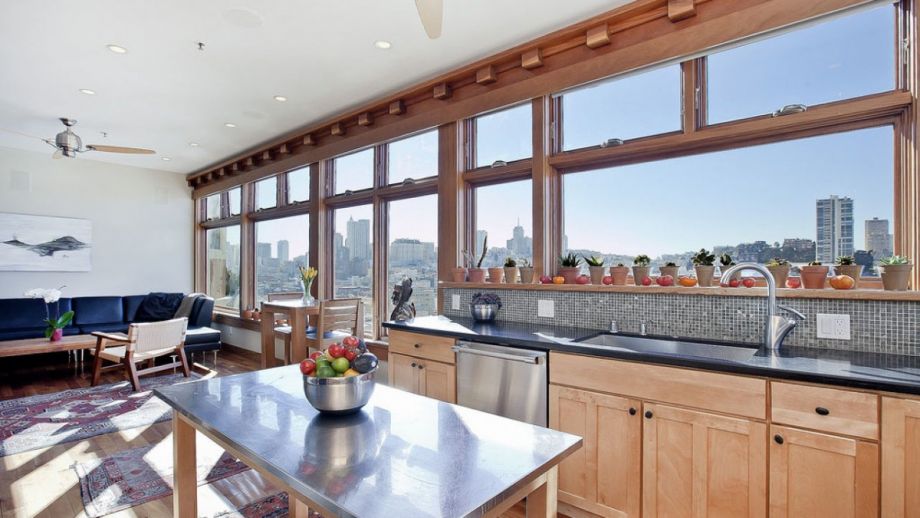For a long time, writes the San Francisco Chronicle’s Carolyn Said, few people have bothered with the “expensive and cumbersome process” of getting the permit San Francisco requires for renting out a room for less than 30 days. But now the city is cracking down on permit-less “hosts” using services like Airbnb, with the City Planning Department ordering them to pull listings and threatening fines if they don’t. Additionally, some landlords have used the violation of city laws as a reason to evict tenants across San Francisco. That, Said reports, includes Jeffrey Katz, a teacher who came home to a notice protesting his “illegally using the premises as a tourist or transient unit.”
Of course, this isn’t only happening in San Francisco. Roanoke, Virginia, is wrestling with how Airbnb fits in with local zoning laws. Residents in Los Angeles’ Silver Lake neighborhood have complained that a new temporary population is changing their neighborhood’s character. But the stakes are particularly high in San Francisco. It’s Airbnb’s home turf, but also a housing-crunched place where evictions might mean both total displacement and an opportunity for landlords to raise rents.
And that’s producing some interesting tensions. The attorney for Jeffrey Katz, the teacher facing eviction, faults Airbnb for not doing a better job informing his client about the law. Katz says that he approached the company for help but it “didn’t seem quite interested.” Airbnb recently announced it would collect and remit occupancy taxes in Portland and San Francisco, as part of its new “Shared City” push. And in a case in New York City this fall, Airbnb took up the defense of Nigel Warren, a host fined for lacking the safety features of a hotel, seeking to pry open an exemption in the state’s multiple dwelling statute. But on this bigger, existential threat to short-term rentals, the company has largely avoided one-off confrontations, preferring to push in both public and private to change the law. Meanwhile, activists for tenants’ rights, says Katz, declined to be of service, making it “abundantly clear that they dislike Airbnb.” Jeffrey Katz is a man without a home in more ways than one.
That is, at least as the current law stands. A lawyer pursuing Katz’s eviction argued that, “the law I’m using is that the city says that there are hotels and there are apartments, and the two shall never meet.” That might be true in a legal sense, the result of well-intentioned pushes in many cities to draw such a bright line to cut down on flophouses and bolster a stable stock of rental units. (And, whether by design or fringe benefit, support the hotel industry.) But in the era of Airbnb, that bright line isn’t quite so bright. Now the argument becomes that such laws actually harm renters by infringing their rights to do what they’d like with their properties. David Chiu, the president of the San Francisco Board of Supervisors has been working since at least 2012 on crafting a law “that allows primary residents the flexibility to share space while ensuring that both neighborhood quality of life and our housing stock are protected.”
But striking such a balance is easier said than done. One approach is to throw all rules out the window: if it’s your place, it’s your place, and you can use it how you wish. But assuming that going completely laissez-faire would open the door to intolerable abuses, nailing down the particulars becomes the problem. Is the answer figuring out how to use our fancy new technologies to make the “cumbersome” way of getting a conditional-use permit something as easy as, say, renting a room on Airbnb? Or should rentals shorter than 30 days not require a permit at all? If a month is okay, why not two? Should renters be allowed to bring in more through an Airbnb than they’re paying on a rent-controlled apartment? If not, why not? What’s the check on landlords evicting renters for whatever reason and then putting the place up on Airbnb? Can you only rent out your primary home? Pied-à-terre? (This is San Francisco.) Again, if not, why not?
Of course, people have long rented out their vacation homes. And they’ve also long fudged compliance with existing rules. But nearly overnight we’ve found ourselves in an era where part-time hoteliering has moved from the fringe to mainstream, from the mountains to center city, thanks in large part to new apps that make it trivially easy to match eager renter and eager host. San Francisco produced that impressive technology. And San Francisco is at the forefront of tackling the questions to which it has given rise.
It is, really, a fascinating public challenge. Though it admittedly probably looks somewhat less fascinating to someone standing on a corner with his or her belongings in a cardboard box.
Correction: An earlier version of this story implied that the city of San Francisco was evicting tenants for violating its short-term tenancy laws, rather than landlords using the violations to move ahead with the eviction process.

Nancy Scola is a Washington, DC-based journalist whose work tends to focus on the intersections of technology, politics, and public policy. Shortly after returning from Havana she started as a tech reporter at POLITICO.








